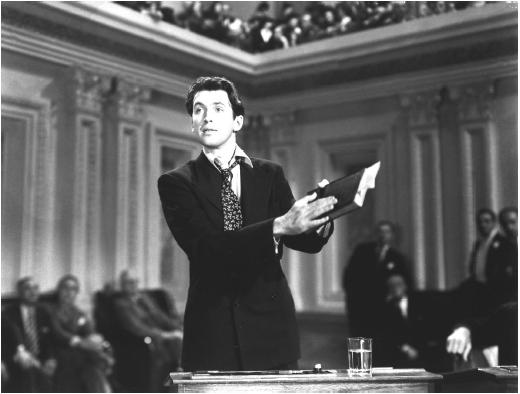In an effort to educate myself about American film and its history I set a goal (on my Ultimate To DO list) to watch all of the films listed on AFI's 100 years, 100 movies list. My hope is that by watching these films with a critical eye and then researching their cast, crew and cultural impact I can "home school" myself through film school. Not a bad way to spend some time and save bunches money, huh?
There was an election yesterday. Had you heard?
In the midst of all the campaign madness (and really as an excuse to get away from the political ads on television) I watched Mr. Smith Goes to Washington this past weekend.
I didn't really like this film. There I said it. Now, I'm afraid commandos are going to storm through my front door and revoke my American citizenship. Perhaps though, that fear can be directly tied to the cultural impact of Frank Capra's masterpiece.
Stay with me, I'll explain. Mr. Smith was first released to audiences in 1939 just months after the outbreak of World War II. Considered "dangerous" for its depiction of corruption in American government there was pressure to delay the film. Mr. Smith is considered one of the quintessential American whistle blower films. The story follows the protagonist's struggle to overcome the dirty dealings and legislation for hire depicted as running rampant throughout the Senate. In 1939, to communicate this idea was DANGEROUS.
Today, the idea that the Senate (and for that matter all of Washington) is full of crooked politicians is commonplace. It is almost understood that one probably doesn't make it into high level political office without a skeleton or two in the closet. I am a product of that cultural belief.
I didn't like the film, because I found Senator Jefferson Smith to be unrealistic, too squeaky clean and unrelateable. After all, NOBODY is THAT genuinely and unabashedly patriotic without some kind of angle. Turns out, I watched the movie through my own cultural bias.
However, after researching the film's history, its cultural impact and its director, Frank Capra, I've (sort of) changed my mind. I now respect it, even if I didn't necessarily enjoy it*. What I dismissed as "Gee-Whiz" fluff, turns out to be much more. Though Capra's theme, "One Man CAN Make a Difference" is unapologetically in your face. (There's definitely no subtlety in the story telling and the viewer is never surprised by EXACTLY what direction the plot the heading.) I would argue that Capra's cynicism had an equal impact on film (and perhaps the culture as a whole) as his wide eyed optimism did. Sure Capra is best known for his squeaky clean protagonists and wide eyed Americana. But, Mr. Smith Goes to Washington has a dark underbelly that permeates the film. The Senate is on the payroll of a shady businessman and it is clear that passing a bill as it is originally intended is tantamount to a miracle. Dark Stuff. Now think about it, when was the last time you saw a film portray our government and the agents of our government as better than that? Though it was considered dangerous in 1939, no one bats an eye at this kind of "dark" story telling today. It's become expected. Now that's cultural impact if you ask me.
Have you seen Mr. Smith Goes to Washington? What did you think?
Better yet, aren't you glad we don't have to watch political ads anymore!! Woo Hoo!

*I found the editing choppy, the use of soft focus on Jean Arthur (the leading lady) distracting and the plot predictable and schmaltzy. Jean Arthur's performance was one bright spot for me though. I found her sass to be adorable and believe she stole the film from Stewart and anyone else who dared to keep up with her pluck and style.

